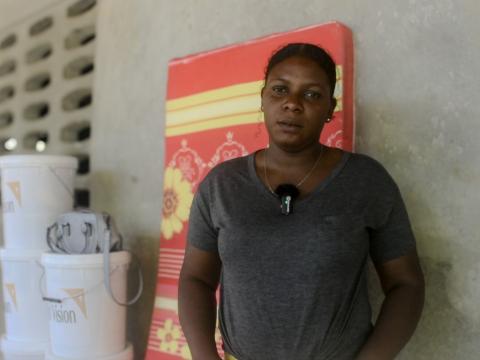Surviving Against the Odds: The Human Toll of Haiti's Crisis

Amid escalating violence and insecurity, Alexandra's family, like many others in Haiti, found themselves thrust into the heart of a humanitarian crisis. Their journey of survival mirrors the plight of thousands, even hundreds of thousands, who have been uprooted by armed conflict and political turmoil, their lives hanging in the balance as the country teeters on the brink of collapse.
In the wake of the turmoil that swept through her neighborhood in June and July, Alexandra and her family found themselves caught in the crossfire of gang violence and insecurity. Forced to abandon their home in Petion-Ville, they embarked on a harrowing journey in search of safety and stability.
Alexandra's journey reflects the harsh reality faced by many in Haiti, where warring gangs control the streets, and the simple act of going to the market becomes a difficult endeavor. "We can't go out. We can't go to the markets. We didn't have enough food to eat," Alexandra recounts, describing the dire circumstances that drove her and her family to leave her home behind.
Fleeing the violence meant braving a perilous journey, relying on public transportation, going through armed groups' controlled roads, and sheer determination to reach a safer haven. With her husband and child by her side, Alexandra navigated through uncertainty, unsure of what awaited them on the other side.
As the crisis unfolds, the exodus from Port-au-Prince continues unabated, with some 95,000 people fleeing the city in the last month, desperately searching for safety. The majority head towards the Grand Sud departments, while an increasing number seek refuge on the island of La Gonave, where World Vision operates, and on the border between Haiti and the Dominican Republic. Yet, even as they flee, the specter of deportation looms large, with more than 4,500 people already expelled from the border by Dominican authorities back in March alone. Despite the continued unrest, the IOM reported that neighboring countries forcibly sent 13,000 migrants back to Haiti in March. That is a 46-percent increase compared with the previous month.
Meanwhile, the humanitarian situation continues deteriorating, with the World Food Program (WFP) warning of a looming food crisis. Significant increases in the severity of insufficient food consumption, income declines, and soaring food prices have left millions at risk of hunger. Staple food products like rice, beans, milk, and eggs have become increasingly scarce, exacerbating an already dire situation.
Amidst the food insecurity, another crisis looms: acute malnutrition. According to the IPC acute malnutrition analysis, nearly 277,000 children are facing or expected to face acute malnutrition, with a myriad of factors contributing, including insecurity, cholera outbreaks, poor food quality, and limited access to clean water. The impact is felt most acutely among vulnerable populations, their lives hanging in the balance as they struggle to survive in the face of overwhelming odds.
Arriving in their new community brought a sense of relief, a respite from the constant fear gripping them in Petion-Ville. "I feel safer here. I feel like I can go out and buy things. I'm not afraid," Alexandra admits, grateful for the semblance of normalcy they've found amidst the chaos.
Yet, amidst the newfound sense of security, uncertainty looms large. For Alexandra and many others like her, the struggle for survival continues. "The biggest difficulty for us is food and accommodation," she shares, highlighting the stark challenges accompanying displacement.
Access to basic necessities such as food, clean water, and healthcare remains elusive, exacerbating displaced families' already dire situation. "The biggest problem for me is the health problem," Alexandra laments, “there’s not even a health center here,” underscoring the urgent need for accessible healthcare services and clean water sources to prevent the spread of disease.
Alexandra and her family were fortunate to receive support from World Vision as it reached 380 IDPs and their families with hygiene kits, kitchen sets, and shelter kits in Port-au-Prince and our Area Programs throughout Haiti. And while Multi-purpose cash assistance will be delivered to 1,000 IDP families in Port-au-Prince throughout April and May, our efforts alone are not enough. The international community must step up and respond to the cries of a nation in crisis, offering support and solidarity to those who have been left to bear the brunt of violence and insecurity. Only then can Haiti begin to rebuild and reclaim hope in the face of adversity.
As Haiti grapples with an escalating humanitarian crisis, Alexandra's story poignantly reminds us of the human cost of conflict and instability. Her resilience in the face of adversity is a testament to the indomitable spirit of the Haitian people, who persevere despite the odds stacked against them.